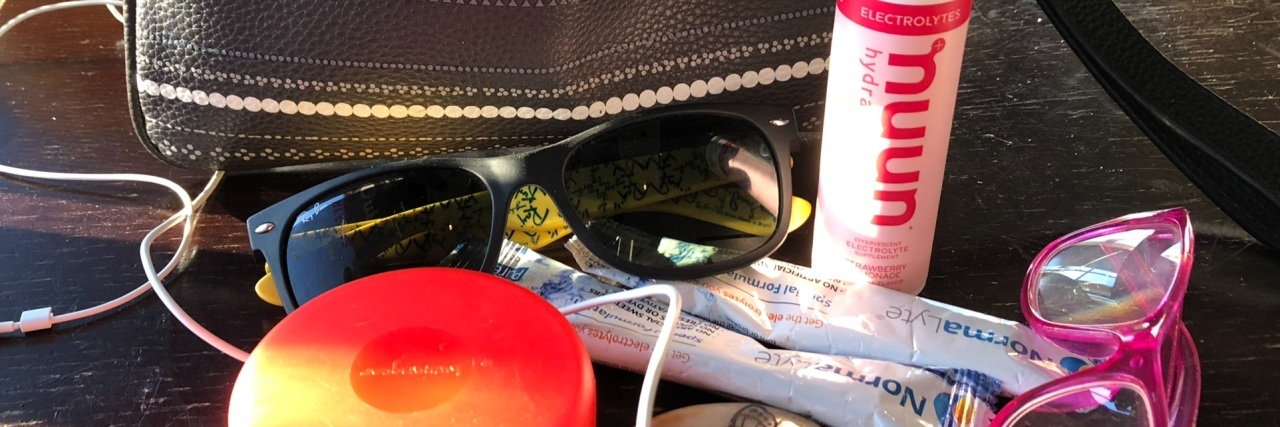If You Have an Unpredictable Chronic Illness, Keep These Items Handy
Editor's Note
We hope the products below help you or a loved one in your health journeys. Just so you know, The Mighty may collect a share of sales from affiliate links on this page.
Be prepared.
I’m sure you have heard this motto perhaps from your mother, father, teacher, employer or even the Boy Scouts of America.
But how do you stay prepared when you have a body that revolts? Chronic illness (in my case dysautonomia among other things) is unpredictable. One minute I may feel pretty healthy and the next my face turns ghost white or bright red, and I feel as if I might puke or pass out.
Yes, the unpredictability of living with a faulty autonomic nervous system or any chronic condition is daunting. But there are some things we can do to be as prepared as possible for what occurs in our daily life.
Do you carry a purse, backpack or any other type of bag? I never did until about seven years ago when hydration became a key ingredient in tackling dysautonomia. Now I recommend some sort of bag to carry on your person or in your car at all times. My trunk holds a large utility tote with jumper cables but also several bottles of Powerade Zero and water too. Typically when I vacuum my car, I find half-filled and empty bottles of these items. I tell myself it is better to have more than enough liquids than to run out!
Here is a quick list of some helpful things to carry in your purse or bag if you have an unpredictable chronic illness:
1. A medical sheet with personal health information.
A medical sheet can include personal information including diagnoses, allergies, medicines, vitamins and emergency contact information. I also subscribe to the MedicAlert Foundation which provides engraved bracelets with diagnoses and backup service information in case of an emergency which medical personnel can access.
2. An extra supply of medications for unpredictable chronic illness symptoms.
I keep at least two days of medications in a container for emergencies in my purse. I know the shapes and colors of each of my medicines that way I don’t worry about mixing them up! (Note! Be sure to check your state to make sure medications can be carried in a pill box rather than a prescription bottle).
3. Don’t forget the sunscreen.
After a cancer scare and removal of such from my face, I have become diligent in wearing sunscreen. Remember, despite and sometimes because of our health problems, we still need to take precautions.
4. Powdered electrolyte drinks can help with unpredictable dizziness related to chronic illness.
My favorite electrolyte drinks are NormaLyte and Nuun. I add free ice water to my Starbucks order and drop in the powder. Something about iced cold water makes these drinks more refreshing!
5. Sunglasses.
Throw a pair of sunglasses in your purse or bag to protect sensitive eyes, and don’t forget they can also help avoid migraines.
6. A pair of athletic/ light running gloves.
When my hands turn cold, it is either a sign that dysautonomia is causing blood pooling in my hands or I, in fact, am cold. Either way, symptoms will begin, and warming my hands with gloves is critical.
7. Cheater eyeglasses.
Eyeglasses are a necessity because at my age I need them to read and write.
8. Trader Joe’s ginger mints.
I find these to work quickly when nausea grabs ahold of me.
9. An inspirational rock.
It reminds me that this life is pretty good despite my health struggles.
10. An iPhone.
Nowadays phones are essential to read, write, listen to music and communicate with people.
11. Hand sanitizer.
I use hand sanitizer when in public spaces to try to avert catching a virus.
12. Something warm like a sweater.
I keep a sweater, flannel shirt, or sweatshirt with me at all times, even in the summer. Air conditioning can make a person with dysautonomia very cold, and since we don’t regulate temperatures, some sort of a cover-up is essential.
Being prepared is important for everyone, but it can be especially critical for people with a chronic illness to help cope with changing bodies.
Would you add anything to this list? Please feel free to comment with your suggestions.
Photo submitted by contributor.

